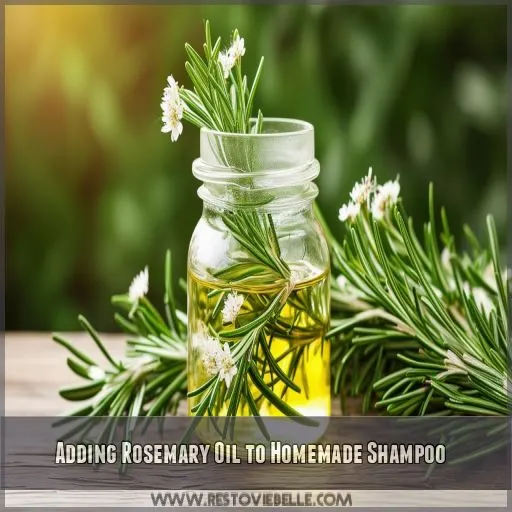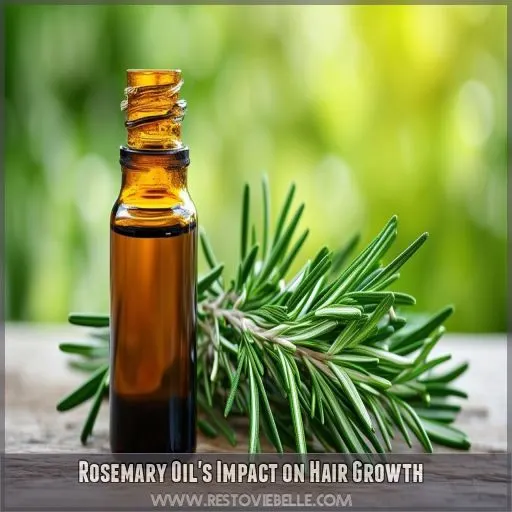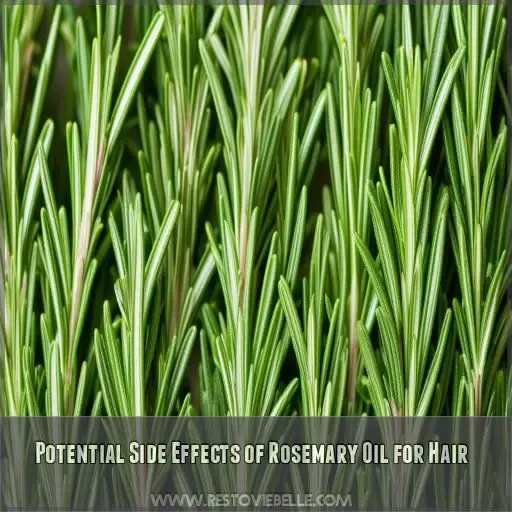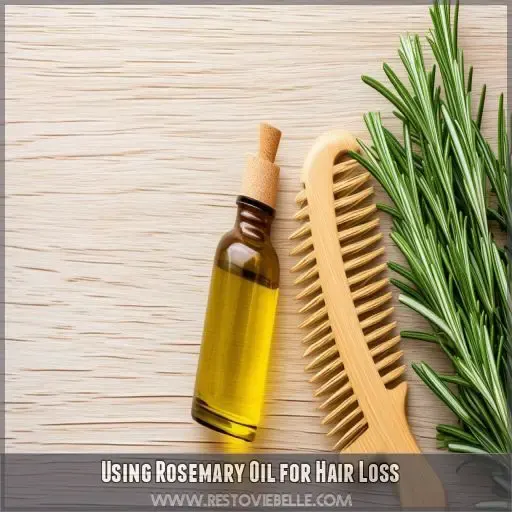This site is supported by our readers. We may earn a commission, at no cost to you, if you purchase through links.
 Rosemary oil is said not only to promote hair growth but also to prevent loss.
Rosemary oil is said not only to promote hair growth but also to prevent loss.
Massaging this potent essential oil into your scalp properly nourishes the follicles and creates an ideal environment for strands to grow.
Conversely, too much rosemary oil can result in undesirable side effects.
This article will help you understand the safe and efficient ways for the use of rosemary oil to attain maximum benefits from it in a hair care regime.
Table Of Contents
- Key Takeaways
- How to Use Rosemary Oil for Hair Growth?
- How to Apply Rosemary Oil to Scalp
- Adding Rosemary Oil to Homemade Shampoo
- Direct Application of Rosemary Oil to Hair
- Rosemary Oil’s Impact on Hair Growth
- Leaving Rosemary Oil in Hair: Yes or No?
- Potential Side Effects of Rosemary Oil for Hair
- Safety Measures When Using Rosemary Oil
- Using Rosemary Oil for Hair Loss
- Creating a Haircare Routine With Rosemary Oil
- Frequently Asked Questions (FAQs)
- Can I apply rosemary oil directly to hair?
- How often should I use rosemary oil for hair growth?
- How do you use rosemary oil for hair growth for beginners?
- Can you just leave rosemary oil in your hair?
- Does rosemary oil help alopecia?
- How to use rosemary oil for hair growth?
- Can you mix rosemary oil with other essential oils?
- How often should I use rosemary oil?
- How does rosemary oil benefit scalp health?
- Can rosemary oil slow premature graying?
- Will rosemary oil help with dandruff control?
- Can rosemary oil reduce itchy scalp symptoms?
- What other uses does rosemary oil have?
- Conclusion
Key Takeaways
- Sure thing, here are 4 key takeaways on how to use rosemary oil for hair growth:
- Rosemary oil can be a powerful tool for hair growth, but it’s important to use it correctly. Diluting it with a carrier oil like coconut or jojoba oil will help to prevent skin irritation.
- You can apply rosemary oil to your scalp, add it to your shampoo or conditioner, or use it in a homemade hair mask. Just be sure to use it consistently for the best results.
- Rosemary oil can help to promote hair growth by stimulating blood circulation and reducing inflammation. It also has antibacterial and antifungal properties, which can help to keep your scalp healthy.
- If you’re experiencing hair loss, rosemary oil may be a helpful natural remedy. Just be sure to talk to your doctor before using it, especially if you’re pregnant or breastfeeding.
How to Use Rosemary Oil for Hair Growth?
To use rosemary oil for hair growth, first mix it with a carrier oil like coconut or jojoba to prevent irritation. Massage the blend into your scalp for five minutes to stimulate circulation and hair follicles.
Alternatively, you can add a few drops to your shampoo or conditioner. For targeted hair loss treatment, apply the diluted mix directly to thinning areas and leave it on for at least 30 minutes, two to three times a week.
Remember to perform a patch test beforehand and avoid use during pregnancy.
Curious about further benefits and safety tips? Keep on to discover more.
How to Apply Rosemary Oil to Scalp
To apply rosemary oil to your scalp, mix rosemary oil with a carrier oil, such as coconut or jojoba oil. Mix five drops of rosemary essential oil with one teaspoon of your selected carrier oil. This will ensure that the treatment won’t irritate your scalp.
Divide your hair into sections; next, using your fingertips, gently massage the mixture into your scalp. Massage, focusing on circular motions to the scalp, will stimulate blood flow. This will improve circulation and help promote hair growth. Be careful with what hair type can use the oils; fine hair may require more light oils like jojoba.
Massage for about five minutes to adequately penetrate the essential oil into the scalp and stimulate healthier follicles for possible re-growth. Do this once a day or as needed.
Adding Rosemary Oil to Homemade Shampoo
Rosemary oil can be used in a homemade shampoo to increase scalp health and promote hair growth.
Start with a simple shampoo base, like baking soda and coconut oil. Add five drops of rosemary oil per ounce to this mix. Alternatively, use rosemary extract for better results since it’s considered a more concentrated form of the essential oil.
Always dilute the carrier oil properly to avoid skin irritation.
Infuse the efficiency of rosemary into your hair products. Full of antioxidants, anti-inflammatories, and antimicrobial properties, rosemary ensures a fit and fine scalp while supporting thoroughly vibrant hair.
Experience the empowering benefit that this natural homemade shampoo remedy can grant you in your quest for stronger, healthier hair.
Direct Application of Rosemary Oil to Hair
Direct application of rosemary oil into the hair can stimulate blood flow, improving its health and probably even causing its regrowth. Always mix a carrier oil with the essential oil to avoid irritation. Mix five drops of rosemary oil with one teaspoon of coconut or jojoba oil as a carrier; massage it into your scalp right down to the roots for optimum benefits.
- Oil Quantity: Use in limited quantities to prevent oily hair.
- Application Frequency: Daily or every other day, depending on your scalp sensitivity.
- Hair Type: All hair types, although it could be heavy on fine hair.
This can promote blood circulation, enhance the circulation of oxygen, cut down on inflammation, and combat hair loss. Make sure to perform the patch test before starting any program to rule out sensitivity.
Rosemary Oil’s Impact on Hair Growth
Rosemary oil has some promising effects on hair growth. It raises circulation and stimulates hair follicles. Research shows that rosemary oil may be as effective as minoxidil, a drug for hair loss, especially in the case of androgenic alopecia.
In its content, rosemary oil abounds in anti-inflammatory and antioxidant loads. These enhance blood flow and the nerve growth factor to rejuvenate hair follicles. In improving circulation, rosemary oil strengthens the base of the scalp itself, theoretically reversing damage and raising the resiliency of hair.
Moreover, its antimicrobial properties help fight against bacterial infections that could be at fault for falling hair. Proper application concerning dilution frequency allows you to harness these powerful benefits for hair growth stimulation and maintenance of good overall health for your scalp.
Leaving Rosemary Oil in Hair: Yes or No?
Applying rosemary oil to your hair overnight isn’t something to be taken lightly since there are benefits and risks. Rosemary essential oil can stimulate blood flow towards the hair roots, hence promoting healthy hair growth, but always mix with a carrier oil** to avoid scalp irritation.
If bound to remain on for extra periods without proper dilution, it will harm the texture of the hair or might cause some breakage. Interestingly, undiluted rosemary oil may aggravate sensitive scalps and lead to critical destruction of the shafts.
For best results and safety, combine five drops of rosemary oil with one teaspoon of carrier oil. Massage it into the scalp, then decide whether the application overnight is suitable for your hair routine or not. Just remember to consider the best way to use rosemary oil for hair growth in conjunction with rosemary oil safety to reap full benefits for hair growth.
Potential Side Effects of Rosemary Oil for Hair
Leaving rosemary oil in the hair can be very beneficial, but one has to be equally cautious about the probable side effects. Rosemary oil is known for causing skin irritation or even an allergic reaction if not diluted well with the carrier oil.
Always perform a patch test by using it on a small area of your skin before applying it to the whole person. Overuse could lead to an oily scalp, particularly if you have fine hair or if your hair is inclined to be greasy.
Another possible drawback of using too much rosemary oil is that since it can promote hair growth, using it in large quantities will weigh down hair, reducing volume and probably causing much discomfort.
Keeping this in mind will allow you to utilize rosemary oil without running into these common problems and get the most from its benefits, making sure not to push toward potential downsides as much.
Safety Measures When Using Rosemary Oil
When using rosemary oil for hair, always prioritize safety. First, dilute the oil with a carrier oil to prevent skin irritations and allergic reactions.
Perform a patch test to check for any skin sensitivities. To avoid any adverse effects, be cautious during pregnancy and breastfeeding, as rosemary oil’s safety in these conditions isn’t well-studied.
Keep the oil away from your eyes to prevent irritation. Use sparingly to avoid greasy hair or scalp issues. If you have underlying skin conditions, consult your dermatologist before incorporating rosemary oil into your routine.
Following these precautions will help you harness rosemary oil’s benefits while minimizing any potential risks.
Using Rosemary Oil for Hair Loss
If you’re struggling with hair loss, rosemary oil may be a natural solution worth exploring. Its anti-inflammatory and circulation-boosting properties can help address the underlying causes of certain types of hair loss.
To use rosemary oil for hair loss:
- Dilute 5-10 drops of rosemary oil in a carrier oil like coconut or jojoba oil.
- Gently massage the mixture into your scalp, focusing on areas of thinning or shedding.
- Leave the oil on for at least 30 minutes before rinsing.
- Repeat this process 2-3 times per week for best results.
Consistent use of rosemary oil may help strengthen hair follicles, promote healthy regrowth, and prevent further loss. Just be sure to patch test first and avoid use during pregnancy. With patience and proper application, rosemary oil could be a game-changer for your hair.
Creating a Haircare Routine With Rosemary Oil
To create a haircare routine with rosemary oil, start by massaging a blend of rosemary oil and carrier oils, like coconut or jojoba, into your scalp. Aim for five drops of rosemary oil per teaspoon of carrier oil. Set aside a few minutes before showering for maximum absorption.
Next, enhance your daily products by adding rosemary oil to your existing hair products, like shampoos and conditioners.
You could also try home remedies, mixing baking soda and coconut oil with rosemary oil for a DIY shampoo. Consistent use promotes hair growth and improves scalp health.
Just remember, moderation is key to avoid potential side effects like oily hair or skin irritation. Integrating rosemary oil can transform your hair care regimen.
Frequently Asked Questions (FAQs)
Can I apply rosemary oil directly to hair?
Apply rosemary oil directly to your hair, and you could quite quickly end up with a greasy mess. Be sure to mix it with some carrier oil before application for both effectiveness and safety against irritation.
How often should I use rosemary oil for hair growth?
Generally, rosemary oil for hair growth can be used daily or whenever needed; however, a lot of this oil will leave your hair extremely greasy. Always dilute it in some carrier oil before applying; this is for safety purposes and efficiency.
How do you use rosemary oil for hair growth for beginners?
Massage diluted rosemary oil (5 drops with 1 teaspoon carrier oil) onto your scalp daily. Apply gently, focus on the roots, leave it on, and avoid contact with eyes. Use consistently for noticeable results.
Can you just leave rosemary oil in your hair?
Yes, you can leave rosemary oil in your hair if it’s diluted with some carrier oil to avoid irritation. Massage this into your scalp lightly and leave it on for hair growth.
Does rosemary oil help alopecia?
Rosemary oil is a powerhouse for tackling alopecia. It’s been shown to improve hair growth similarly to Minoxidil in studies. Its anti-inflammatory and circulation-boosting properties can revive dormant follicles, helping you reclaim your mane.
How to use rosemary oil for hair growth?
Dilute rosemary oil with a carrier oil and massage it into your scalp daily. You can also add it to your shampoo or homemade hair products to support hair growth and overall scalp health.
Can you mix rosemary oil with other essential oils?
Variety is the spice of life." You can blend rosemary oil with other oils like lavender or peppermint; however, remember that it should always be diluted in a carrier oil so as not to irritate the skin and bring maximum benefits.
How often should I use rosemary oil?
Apply diluted rosemary oil daily or as needed, but don’t overuse it to avoid skin or hair issues. Using it too often with a carrier oil can result in oily hair. Aim for consistency and moderation.
How does rosemary oil benefit scalp health?
Rosemary oil benefits scalp health by promoting blood circulation, reducing inflammation, and providing antibacterial properties. This combination can help with dandruff, itchy scalp, and maintaining overall scalp health, supporting a conducive environment for hair growth.
Can rosemary oil slow premature graying?
Like a tree that grows old with nourished roots, rosemary oil’s antioxidants may help delay this graying process prematurely by scavenging free radicals responsible for cellular damage in hair follicles. Apply diluted oil to the scalp regularly for potential benefits.
Will rosemary oil help with dandruff control?
Yes, rosemary oil can help control dandruff due to its antimicrobial and anti-inflammatory properties. When properly diluted with a carrier oil, it can relieve dry, itchy scalp conditions and prevent dandruff formation.
Can rosemary oil reduce itchy scalp symptoms?
An ounce of prevention is worth a pound of cure. Yes, rosemary oil can reduce itchy scalp symptoms. Its anti-inflammatory and antimicrobial properties soothe irritation, providing relief when diluted and massaged into your scalp.
What other uses does rosemary oil have?
Rosemary oil also promotes memory enhancement, supports wound healing, improves circulation, and aids nerve growth. Additionally, it contains antioxidants, anti-inflammatories, and antimicrobial properties, making it versatile for various health and wellness applications.
Conclusion
The irony is that the genuine tricks behind rosemary oil’s potential for hair growth are about its cautious application. Adequate use—either through massage into your scalp, addition to shampoo, or direct use—will eventually and effectively stimulate the follicles.
Overuse may, however, be equally dangerous and provoke side effects. You can adopt these methods to integrate into your routine to maximize growth while minimizing the risk. Knowing "how to use rosemary oil for hair growth" safely will yield the best results without moderately jeopardizing your hair’s health.














